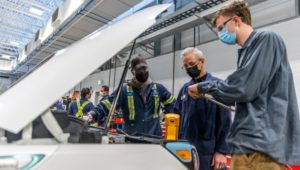In March of last year, the province contributed $440,000 toward electric vehicle maintenance training at post-secondary institutions, and Camosun College is among the first four schools in the province to offer this training.
The pilot courses began in mid-November of 2021. They ran for a week, with an additional six hours of online work. Each pilot filled up, and Automotive Service Technician instructor and program leader Patrick Jones, who taught the pilot courses, says that there’s a long list of students interested in course enrollment; he expects that Camosun will be running at least two classes per year.
“This program was developed with funding from the ministry of Energy, Mines and Low Carbon Innovation,” says Jones. “BCIT did the curriculum development and then the program was rolled out to three other colleges around the province, and Camosun College was successful in becoming the island provider for the course. However, because this technological area is advancing so quickly, the curriculum is a little bit fluid.”

Tyler Pielle, who participated in the pilot course, says that it was an engaging combination of theory and hands-on work.
“Patrick did a really good job of squeezing a lot into one week,” says Pielle. “The amount of time that he’s put into it is very inspiring, and the enthusiasm that he has for it, too. It really helps people like me being young in the trade and wanting to build experience in it.”
Despite their widespread implementation being relatively new, Jones has been focusing his professional development on electric and hybrid vehicle training for five years. Because of this, he’s optimistic about Camosun’s stance as a leader in this industry.
“I’m aware of one school in Quebec that is probably a little bit further ahead of us here in BC, but as far as the rest of the country goes, I think BC is at the front,” says Jones. “I think here at Camosun we’re probably doing it better than any other colleges in the province. I have some instructor certifications through the SAE [Society of Automotive Engineers – Industry Technologies Consortia] to be a teacher in EVs, which I know the other instructors in the province don’t have, so I think we’re pretty well positioned.”
Following Quebec, BC is the second province in Canada to enact EV standards, and the first jurisdiction in the world to legislate a target of 100 percent of car sales being electric. Both Pielle and Jones feel that this goal is realistic and that anyone currently going into trades will need some EV training to keep up with advancements in the ever-evolving field.
“I think it’s a great goal,” says Jones. “I think it is, but it’s going to take quite a bit of infrastructure investment, as far as more charging stations for vehicles, because that is a bit of a concern if they’re after wide adoption. And investments in the power grid as well. As far as cost goes, as [electric vehicles] become more common I think the costs are going to come down.”
As the EV industry continues to advance in infrastructure, training, and accessibility, Jones looks forward to helping students gain a complete understanding of the technology. He anticipates that as the electric-vehicle field grows the college will develop more levels of training.
“I’m super enthusiastic about delivering this program,” says Jones. “I think the big thing is being kind of at the forefront of education on something that is so new and has such major implications for society. I think it’s really cool to be in this position, and I’m really stoked about it.”
Last year the provincial government put in regulations to help prepare for all light-duty vehicle sales to be electric by 2040, following the Zero Emissions Vehicle act passed in 2019.
